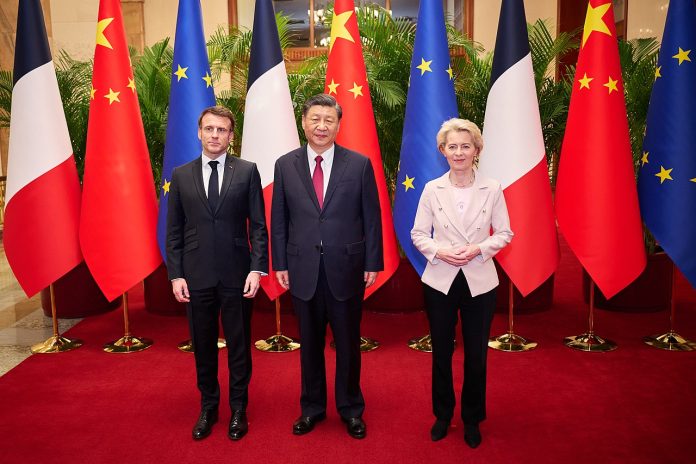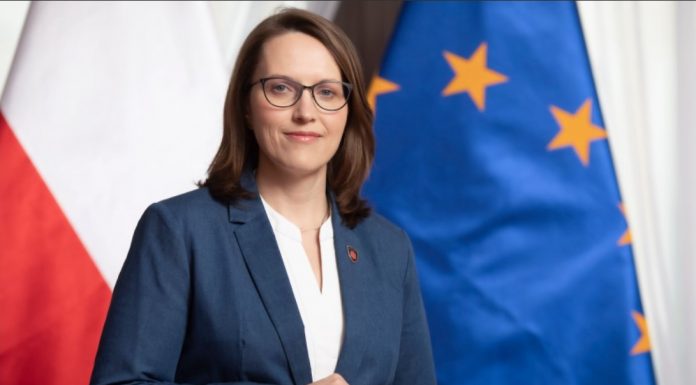
By Samuel Furfari, formerly a senior official at the Energy Directorate-General of the European Commission (1982-2018), Professor em. at Université libre de Bruxelles and President of the European Society for Engineers and Industrialists
Why did Ursula von der Leyen agree to join French President Emmanuel Macron to China? This did not help either Ukraine or Taiwan. In any case, China’s CO₂ emissions will still rise and the EU will end up as the last global actor to dream of decarbonisation.
My director-general at the European Commission used to say that in order to succeed, one needs to know who to surround oneself with. He has done this in an extraordinary way. Without advisors with original and wise ideas and that are not ‘yes men’, it is difficult to navigate an increasingly complex world. Ursula von der Leyen’s recent visit to China is proof of this. Then who advised the President of the European Commission to travel to Beijing to accompany Emmanuel Macron on his state visit?
The recent China visits by 🇫🇷Macron & EC president von der Leyen (🇪🇺) underlined a division in Europe to what extent national security issues shape relations with 🇨🇳
short 🧵 pic.twitter.com/lBW2mnIxpa
— Moritz Rudolf (@MoritzRudolf) April 10, 2023
It is true that Ursula von der Leyen is where she is because of Emmanuel Macron, given how it was him that, in a grand bargain with Angela Merkel, allowed his elected representatives in the European Parliament to vote in favour of this German politician in exchange for handing control of the European Bank to France’s Christine Lagarde.
It is true that Macron wanted to demonstrate the unity of the EU by welcoming an important figure into his fold. He had wished to go to China with Olaf Scholz to show the unity of the EU, but the German chancellor preferred to go alone in November 2022, which annoyed Paris. The French president has therefore shown to support EU unity, but it cannot be said that this has improved the image of the European Commission. The Brussels-based institution will therefore need to analyse what happened before agreeing these kinds of joint visits again in the future.
This week, French President Emmanuel Macron was given the full red-carpet treatment in Beijing. When European Commission President Ursula von der Leyen arrived, she got the ecology minister — at the regular passenger exit. https://t.co/LP448CFX8G
— POLITICOEurope (@POLITICOEurope) April 7, 2023
An increasingly weak EU economy
It is true that this was an opportunity to celebrate the 20th anniversary of the comprehensive strategic partnership between China and the EU. A balanced development of trade relations between China and the EU should benefit both sides while, as Montesquieu said, trade is supposed to contribute to peace and stability in the world. We have made a good start, but China’s rise and the EU’s growing economic weakness, due to costly decarbonisation, now give rise to more doubts than satisfaction.
A few days after the visit of the President of the European Commission, discussions with the EU will continue in China from 13 to 15 April with Josep Borrell, the EU’s High Representative for Foreign Affairs. Macron travelled to Beijing with a trade delegation, just like German Chancellor Olaf Scholz before him. On 31 March, it was the turn of Pedro Sánchez, the Spanish Prime Minister, who was delighted, among other things, to have signed an agreement to export 50,000 tons of almonds to China… Whether one likes it or not, this is the best way to do business with China, but Mrs von der Leyen cannot, unlike her own country or France, be accompanied by industrialists.
In her first speech as President, Mrs von der Leyen said that “her Commission” would be geopolitical and that it was therefore to be expected that the European Commission would be increasingly visible in the world. This is why she is increasingly seen alongside the Secretary General of NATO, a novelty.
A few days before her trip, she used strong words for China, describing it as “repressive” on human rights, stating:
«These escalatory actions point to a China that is becoming more repressive at home and more assertive abroad.»
This would explain why China’s leader Xi Jinping did not accord her the same honours he reserved for the French president. She was not invited to the state dinner in honour of the prestigious host, she did not hold a press conference with the Chinese president, instead meeting the press at the EU representation office in Beijing. The clear message here is that Beijing does not see the EU as a global geopolitical interlocutor. This is unfortunate, given how the European Commission is the main European institution, the heart of the EU.
China’s CO₂ emissions rose by 311% since the UN pledged to reduce them
When Emmanuel Macron got off the plane in Beijing, he was welcomed on a red carpet by Chinese Foreign Minister Qin Gang, a senior official and close associate of Xi Jinping. Ms. Von der Leyen, a proponent of decarbonisation, was greeted at the usual passenger exit by Ecology Minister Huang Runqiu.
After all, this makes sense. In her pre-departure speech, the President of the European Commission stated that she intended to work with China “ahead of COP28”. Beijing is thus showing the EU that it knows its raison d’être today is not geopolitics, but nothing more than a desire to boost intermittent and variable renewables and ostracize nuclear power, while China pushes for innovation, with new nuclear reactors, as it has also built a coupled of hundred coal-fired power plants in 2022.
"Five proposals for abundant and cheap energy"
– By Samuel Furfari, formerly a senior official at the Energy Directorate-General of the European Commission (1982-2018) and Professor at ULB: https://t.co/AxGb3R05ES @FurfariSamuele #energycrisis #EU @KadriSimson— BrusselsReport.EU (@brussels_report) August 23, 2022
China has seen its CO₂ emissions rise by 311% since the UN pledged to reduce them. By penalising its economy, the EU has managed to reduce its emissions by 23% over the same period, but at what cost! China accounts for one-fifth of global air traffic and it is growing at more than 5% per year. Airbus estimates that the Chinese market will need 8,500 aircraft over the next 20 years. All of this will increase global CO₂ emissions again and again because electrofuels are a scientific artifice invented by MEPs.
That is why it is a great success for France to have sold 292 A320s in 2022 and 40 A320s. The Chinese state agency, which buys planes on behalf of local airlines, has committed to ordering 160 Airbus planes (150 A320s and 10 A350s). Airbus will be able to double its aircraft production capacity in China thanks to the construction of a second assembly line at its factory in Tianjin, near Beijing. France is thus showing its confidence in cooperation with China economically, thereby also demonstrating that it is not following the anti-China policy of the United States.
This is a far cry from the rhetoric about reducing CO₂ emissions.
"For the President of France, strategic autonomy is crucial to avoid European countries being just 'vassal states' rather than a third strategic axis, on the same level as the U.S. and China."
So Macron sees Europe as standing on its own two feet. pic.twitter.com/Hlhsi5ufrp
— Eric Garland (@ericgarland) April 10, 2023
Taiwan versus Ukraine
Predictably, both Macron and von der Leyen called on Xi Jinping to use his relationship with Vladimir Putin to try to end the war. After Xi Jinping’s very friendly visit to Moscow a few days ago, it would have been unrealistic to expect Russian condemnation. On the contrary, a few days later – on 10 April – a statement from China did not bode well: while feigning a closure of the island of what it still considers one of its provinces, Beijing declared that “Taiwan’s independence is incompatible with peace”. The message to NATO: if you want peace in Ukraine, I can talk to Vladimir Putin, but let me take Taiwan. Global geopolitics is like a huge object stuck in the universe: you flick it and the object goes into all kinds of directions.
Strategically, Xi Jinping could take advantage of the US involvement in Ukraine in its proxy war with Russia to try to invade Taiwan. However, the cost in human lives and diplomatic relations would be much higher than that paid by Russia. Invading a well-defended island is complicated enough, as Russia’s difficulties on Snake Island in the Black Sea have shown, but when it comes to one of the world’s most modern countries, the task will be even more complicated. Xi Jinping reportedly assured the European visitors that he would be ready to call Ukrainian President Volodymyr Zelensky “when the time comes and the conditions are right”.
In fact, Beijing has no interest in rushing the adventure. China has plenty of time, because as long as the war in Ukraine lasts, the US, the EU and Russia will destroy each other. Who will China defeat in this gigantic chess game whereby the recomposition of the world order is at stake? China’s lack of consideration for Ursula von der Leyen seems to indicate an answer to this question. It is time for the EU to realise that it should be concerned with the functioning of the common market, not the functioning of the world, also because Member States will not allow it to do so.
Macron's China trip/interview are exploding the internet. A few somewhat out of the box takes from me. First, the trip was terrible for EU China policy BUT it achieved something big: it may ensure China doesn’t send arms to Russia. This has been overlooked. But its huge. 1/
— Max Bergmann (@maxbergmann) April 11, 2023
Originally published in French by Conflits
Disclaimer: www.BrusselsReport.eu will under no circumstance be held legally responsible or liable for the content of any article appearing on the website, as only the author of an article is legally responsible for that, also in accordance with the terms of use.












